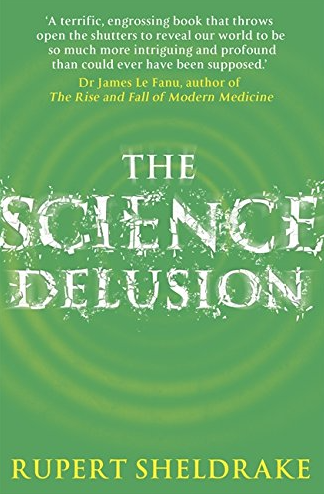 I just started to read biologist, author and international speaker Rupert Sheldrake's 2012 book Science Set Free, or as it is called in the UK The Science Delusion, the better title in my mind. To me it is always refreshing when scientists begin to see the light, err ...spirit, in things. Sheldrake's bone to pick is that many scientists believe that science knows already everything there is to know and that only the details need to be filled in. This limiting belief leaves no room for true inquiry, instead defining upfront what may or may not be researched. His main criticism of science is that it operates within a dogmatic self-perpetuating system that accepts results within the expected belief norms, but ignores or explains away results that are out of the norm, and will not entertain research into areas our culture currently tags as "non-scientific." True science, he says, should be able to forge ahead with an open mind and consider all options.
I just started to read biologist, author and international speaker Rupert Sheldrake's 2012 book Science Set Free, or as it is called in the UK The Science Delusion, the better title in my mind. To me it is always refreshing when scientists begin to see the light, err ...spirit, in things. Sheldrake's bone to pick is that many scientists believe that science knows already everything there is to know and that only the details need to be filled in. This limiting belief leaves no room for true inquiry, instead defining upfront what may or may not be researched. His main criticism of science is that it operates within a dogmatic self-perpetuating system that accepts results within the expected belief norms, but ignores or explains away results that are out of the norm, and will not entertain research into areas our culture currently tags as "non-scientific." True science, he says, should be able to forge ahead with an open mind and consider all options.
 In this case, the whole crux of the debate is of course whether nature is intelligent or not, or whether clinging to the atheist thought system that reduces us all to robotic machines is really all there is. Cell biologist Bruce Lipton is another one who risked his reputation in 2005 when he published his Biology of Belief. He, too, has become a wildly popular international speaker on the inherent intelligence of all life and the fabulous implications that recognition brings with it.
In this case, the whole crux of the debate is of course whether nature is intelligent or not, or whether clinging to the atheist thought system that reduces us all to robotic machines is really all there is. Cell biologist Bruce Lipton is another one who risked his reputation in 2005 when he published his Biology of Belief. He, too, has become a wildly popular international speaker on the inherent intelligence of all life and the fabulous implications that recognition brings with it.
Both books are great mind openers from great scientists to set us free from our stale materialistic dogma.
